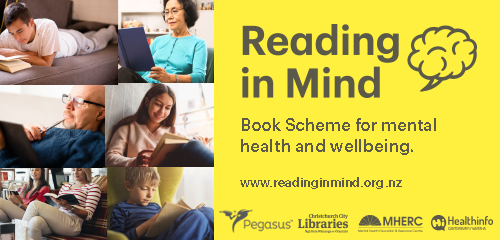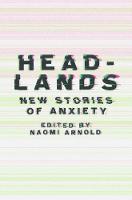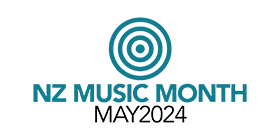On Thursday 3 October at Tūranga, former TVNZ health reporter Lorelei Mason hosted a fascinating discussion on mental health and bibliotherapy with a panel of authors and mental health professionals. The evening shone a light on a topic which, tragically, people are often too afraid and too ashamed to speak of. One in 6 New Zealander's suffer from a mental health condition, and as Lorelei pointed out in her introduction, our system is woefully inadequate to deal with it, with its lack of staffing, resources, and any clear direction. Money has been thrown at mental health, with no clear plan in mind.
Lorelei reflected that in all her years as a health correspondent, she has covered the good, bad, promising, frustrating, miraculous, and disappointing. One positive trend that she has noticed in recent years is that mental health is mercifully coming out of the shadows, with less stigma attached. More and more, people are feeling compelled to share their stories, from celebrities to professionals, teenagers, and even families and friends of the afflicted. She gave the example of a young shepherd featured on Country Calendar, who began a tour encouraging farmers to 'Speak Up' after losing her boyfriend to depression.

She also drew the audience's attention to studies done showing the positive effects of reading on mental health. It has long been acknowledged that reading helps you to sleep, eases tension, and can even help with symptoms of dementia. The Reading in Mind Scheme aims to ease mental health symptoms and provide patients with the knowledge and literature to understand their afflictions. "People feel validated" said Lorelei,"these recovery narratives remove that personal stigma they are feeling. They realise that they are not alone".
 Some of these recovery narratives include the gut wrenching Headlands: New Stories of Anxiety edited by Naomi Arnold. Written by health professionals, writers, musicians, and social workers, these narratives tell the real stories of those suffering from anxiety, in often the most haunting and confronting way. Naomi explained her inspiration for putting this work together was her husband, who suffers from panic attacks: "The first time I saw it, I thought it was like a seizure, but with a seizure you have permission to be ill". A few days ago, he suffered a panic attack at the thought of having to pick up a trailer. Naomi described bundling her shaking husband into a car, taking him to McDonalds, reassuring him. "It's difficult to explain to family and friends" she confessed. "After the attacks, he suffers days and days of self recrimination. My husband has survived 8 years of this - with family distancing themselves, getting sick of it. Sometimes that's been me too. Screaming in my head all the wrong things".
Some of these recovery narratives include the gut wrenching Headlands: New Stories of Anxiety edited by Naomi Arnold. Written by health professionals, writers, musicians, and social workers, these narratives tell the real stories of those suffering from anxiety, in often the most haunting and confronting way. Naomi explained her inspiration for putting this work together was her husband, who suffers from panic attacks: "The first time I saw it, I thought it was like a seizure, but with a seizure you have permission to be ill". A few days ago, he suffered a panic attack at the thought of having to pick up a trailer. Naomi described bundling her shaking husband into a car, taking him to McDonalds, reassuring him. "It's difficult to explain to family and friends" she confessed. "After the attacks, he suffers days and days of self recrimination. My husband has survived 8 years of this - with family distancing themselves, getting sick of it. Sometimes that's been me too. Screaming in my head all the wrong things".
Naomi urges family and loved ones to not turn away from those they know are suffering. "Just be there, phone them and say 'Let's have a quiet one in then and eat chocolate together'." Naomi read from her introduction, including this powerful passage:
"If you have anxiety, the voices in this collection offer reassurance and validation... The voices here know what its like to struggle for breath, to curl up on the cool bathroom floor, to avoid going out. To not know how to relax like others can. To sit in the office bathroom and try to do your breathing. To spend night after night listening to meditation apps, only to lose hours of darkness to a thrashing heart and awake at three in the morning gasping for breath. To stay awake until dawn - and then get up anyway, facing the world with sand in your eyes and a fist punching your gut".
Victoria Broome, a gifted poet herself, read award winning poet Tusiata Avia's devastating account of her crippling experiences with anxiety, from her chapter in Headlands 'As Fresh as They Come':
'Shame is a dark dancing partner and he prefers - he demands - complete silence. Sewn-up lips. I believe shame must be unmasked, brought into the centre of the room; the hypnotic music must be turned off and the lights turned on. For me this is the remedy that dissolves the stitches and stops the dreadful tango.'
Other speakers included youth GP Sue Bagshaw, who discussed her dream of a one-stop health hub for youth in Christchurch (with hopefully Auckland and Wellington following suit one day). This would be a place for young people to fulfil their potential, with free access to counsellors, housing for youth unable to live at home, as well as places for creativity and relaxation:
"Wouldn't it be great if we could treat the symptoms, rather than the illness later, by having a place young people can come to feel included and part of something".
She also extolled the power of reading in helping with these symptoms: "People with trauma don't like groups - with books you are in a group without realising it". While she dislikes labels, she spoke of a patient who expressed his relief at being diagnosed with a 'label' as this meant 'he didn't have to feel like a bad person'.
Lorelei also handed the mic to Katie Brown and Victoria Broome of Pegasus Health, to talk about Reading in Mind. This fantastic initiative was born when Pegasus, MHERC and Christchurch City Libraries teamed up in an effort to support good mental health through reading. Now the scheme offers 250 books and DVDs for hire, recommended by mental health professionals and organisations. Victoria, who suffered from a panic disorder herself, longingly noted that she wished it had been around when she was young:
"There was nothing that gave me an understanding of my experience, an experience shared by thousands of people who still have wonderful, fulfilling lives".
She described one rewarding moment where she was able to present a client, struggling to find her way in the world, with the very literature that spoke to her via 'Reading in My Mind'. She also took the example of a young woman who read Tess of the D'urbervilles.:
"She told me her identification with the book assisted her to get through the year. Its almost a sacred moment when you realise you are not the only one".
Jane Keenan, one of the wonderful selection and access librarians at Christchurch City Libraries, also spoke of the power of reading, as well as the power of libraries themselves:
"Reading of another's experience can be life changing, coming to the library can be time out, and if that is too difficult, you can read online... libraries have a real commitment to the needs of the community, and a sense of hope".
Steve Langley was the final author to take the stage. A creative writing teacher and editor of Been There, Young Peoples' Stories of Struggle and Hope, he was very justifiably proud of the stories his students had presented:
"We tend to hear about the prize winners, the top students in the sports teams. But what about the broken people who still get up each day, come to school, and battle through their lives. I give you the real heroes in this volume".
He warned readers that the stories here would make them angry, amazed, and moved to tears. The abuse encountered by our young people is shocking and difficult to read, ranging from racism to rape. His students described the process of writing these narratives as therapeutic. Often they had never put their experiences and emotions into words before.
Jessie read the gut wrenching but ultimately inspiring story of Whakahira entitled 'I want to not want to die'. Aged just 17, Whakahira battled anorexia and suicidal tendencies after a childhood of abuse. Her words, written with an wisdom and eloquence that belie her years, seem a fitting way to end any discussion on the dark, crippling world of depression and anxiety:
"Getting better isn't about being the best, or never thinking the same way again. Its not about being 'normal' or 'fixed'. Its about learning that things can still get hard sometimes, and knowing it always gets better. It's acknowledging that sometimes you will stumble, or take a couple of steps back and yet actively changing your behaviours and perspectives anyway. It's about telling yourself 'I've got this. I might not be ok right now, but I am going to be. Eventually. Especially when you don't believe it. ... So to that one teacher who asked me what I wanted out of all this, to which I replied 'I want to not want to die', I am happy to say that I have surpassed that goal. I have never been more ready to live. Thank you for helping me, and I hope I can help others now too'"




Add a comment to: Reading in Mind – An evening of Bibliotherapy